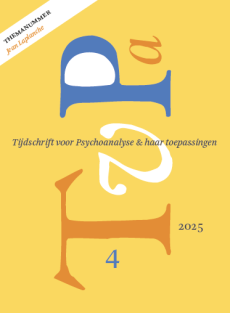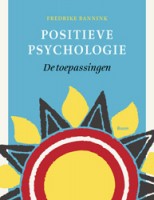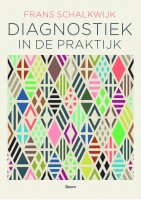Vrijheid in seksualiteit doen wortelen
Summary
Rooting freedom in sexuality: was this psychoanalytic ideal too crazy?
Psychoanalysis started as a crazy project: helping people by refusing both to assist them to reach a predetermined goal and to adapt them to others’ wishes. It insisted on promoting the patient’s freedom. This was initially understood as the loosening of a too strict Super-Ego, especially in sexual matters. The widening of the scope of psychoanalysis demonstrated that mere analysis of the Super-Ego was not sufficient in the case of many pathologies and that deeper psychological layers were often more important than sexuality. Moreover, sexual taboos disappeared in culture. As a result, the central ideas of Freud’s Three Essays became underestimated.
In line with Fonagy (2008) the author advocates a renewed reading of these in order to understand how sexual experience as a ‹near borderline experience› gives the subject capability of establishing a kind of identity capable of making choices and relying on other human identities.
Literatuur
- ANATRELLA T. (2005). Le règne de Narcisse — Les enjeux du déni de la différence sexuelle. Parijs: Presses de la Renaissance.
- FONAGY, P. (2008). The genuinely developmental theory of sexual enjoyment and its implications for psychoanalytic technique. Journal of the American Psychoanalytic Association, 56, 11-36.
- FOUDRAINE, J. (1971). Wie is van hout … Een gang door de psychiatrie. Bilthoven: Ambo.
- FREUD, S. (1920). Over de psychogenese van een geval van homoseksualiteit bij een vrouw. Werken 8 (p. 133-157). Amsterdam: Boom.
- FREUD, S. (1921). Massapsychologie en Ik-analyse. Werken 8 (p. 227-292). Amsterdam: Boom.
- HÄFNER, H. (1960). Trefwoord: ‹Gewissen — tiefenpsychologisch›, Lexikon für Theologie und Kirche IV. Freiburg: Herder.
- LACAN, J. (1948). L’agressivité en psychanalyse. Écrits (p. 101-124). Parijs: Seuil.
- LACAN, J. (1949). Le stade du miroir comme formateur de la fonction du Je. Écrits (p. 93-100). Parijs: Seuil.
- LEBRUN, J.-P. (1997). Un monde sans limite — Essay pour une clinique psychanalytique du social. Toulouse: Érès.
- MILGRAM, S. (1974). Obedience to authority — An experimental view. Londen: Tavistock.
- ROY, O. (2008). La sainte ignorance — Le temps de la religion sans culture. Parijs: Seuil.
- SCHALKWIJK, F. (2006). Dit is psychoanalyse — Een inleiding tot de geschiedenis, theorie en praktijk van de psychoanalyse. Amsterdam: Boom.
- TRAIMOND, J.M. (2005). Dissection du sadomasochisme organisé — Approches anarchistes. Lyon: Atelier de création libertaire.
- VANDERMEERSCH, P. (1978). Het gekke verlangen — Psychotherapie en ethiek. Antwerpen: de Nederlandsche Boekhandel.
- VANDERMEERSCH, P. (1982). Het narcisme — De psychoanalytische theorie en haar lotgevallen. In: J. H. Huijts (red.), Ik zei de gek — Tussen zelf-ontkenning en zelf-verheerlijking (p. 32-58). Baarn: Ambo.
- VANDERMEERSCH, P. & WESTERINK, H. (2007). Godsdienstpsychologie in cultuur-historisch perspectief. Amsterdam: Boom.
- VERGOTE, A. (1976). La névrose dépressive. Topique, 17, 97-126.
- VERHAEGHE, P. (2009). Het einde van de psychotherapie. Amsterdam: de Bezige Bij.
- WALLERSTEIN, R.S. (1964). The role of prediction in theory building in psychoanalysis. Journal of the American Psychoanalytic Association, 12, 675-691.
 © 2009-2026 Uitgeverij Boom Amsterdam
© 2009-2026 Uitgeverij Boom Amsterdam
ISSN 1382-516x
De artikelen uit de (online)tijdschriften van Uitgeverij Boom zijn auteursrechtelijk beschermd. U kunt er natuurlijk uit citeren (voorzien van een bronvermelding) maar voor reproductie in welke vorm dan ook moet toestemming aan de uitgever worden gevraagd:
Behoudens de in of krachtens de Auteurswet van 1912 gestelde uitzonderingen mag niets uit deze uitgave worden verveelvoudigd, opgeslagen in een geautomatiseerd gegevensbestand, of openbaar gemaakt, in enige vorm of op enige wijze, hetzij elektronisch, mechanisch door fotokopieën, opnamen of enig andere manier, zonder voorafgaande schriftelijke toestemming van de uitgever.
Voor zover het maken van kopieën uit deze uitgave is toegestaan op grond van artikelen 16h t/m 16m Auteurswet 1912 jo. Besluit van 27 november 2002, Stb 575, dient men de daarvoor wettelijk verschuldigde vergoeding te voldoen aan de Stichting Reprorecht te Hoofddorp (postbus 3060, 2130 KB, www.reprorecht.nl) of contact op te nemen met de uitgever voor het treffen van een rechtstreekse regeling in de zin van art. 16l, vijfde lid, Auteurswet 1912.
Voor het overnemen van gedeelte(n) uit deze uitgave in bloemlezingen, readers en andere compilatiewerken (artikel 16, Auteurswet 1912) kan men zich wenden tot de Stichting PRO (Stichting Publicatie- en Reproductierechten, postbus 3060, 2130 KB Hoofddorp, www.cedar.nl/pro).
No part of this book may be reproduced in any way whatsoever without the written permission of the publisher.
Nieuwsbrief Boom Psychologie
Meld u nu aan en ontvang maandelijks de Boom Psychologie nieuwsbrief met aantrekkelijke aanbiedingen en de nieuwe uitgaven.
Aanmelden


